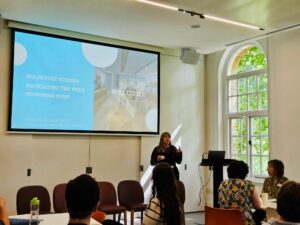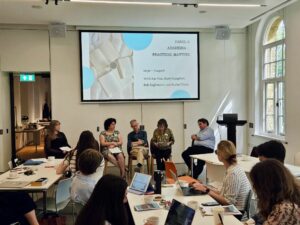
On 30 May, the German History Society funded a networking event for UK postgraduate students and early career researchers in Holocaust, Jewish, German, and Genocide Studies. The event was organized by Cailee Davis, a PhD researcher at the University of Oxford, and was generously hosted by the IWM London.
The networking event was attended by two dozen postgraduate students and early career researchers from across the UK. The day-long programme featured two roundtables, for which participants submitted questions ahead of time.
The first roundtable focused on practical matters of academia and featured Sue Vice (University of Sheffield, Holocaust Media), Barry Langford (Royal Holloway, Holocaust Cinema), Rachel Pistol (EHRI-UK, University of Southampton), and Bob Eaglestone (Royal Holloway, Holocaust Literature). The speakers provided advice and guidance on an array of topics, including manuscript publishing, securing postdoctoral positions, and the ongoing changes across the fields relating to the global rise in antisemitism and the Israel-Palestine conflict.

The second roundtable focused on alternative career paths to academia and featured Elise Bath (The Wiener Holocaust Library, ITS Archive Manager), Alexandra Lloyd (University of Oxford, German History), James Bulgin (Imperial War Museum, Holocaust Galleries Curator), Rachel Seiffert (Award-winning Novelist), and Clare Lawlor (Imperial War Museum, Holocaust Education). Each speaker spoke to their own career-paths in museum, archive, and freelance work, providing advice on job interviews, resume-building, and other related topics.
Crucially, each roundtable was followed by speed-networking sessions during which participants were able to speak to both their peers and the guest speakers one-on-one. These hour-long sessions allowed participants to build critical connections and discuss both questions arising from the roundtables and specific issues relating to their own research and careers. Many attendees found this to be the most productive and helpful part of the event.
Participants enjoyed the day and found the networking event so productive that several inquired as to whether the event would be repeated. Considerable need was expressed for an annual event at which to foster community and continue to explore the new and ongoing issues across the fields. Davis is now in talks to partner with known-Holocaust institutions, including EHRI-UK and the Holocaust Research Consultancy, in order to continue delivering support to UK scholars in Holocaust, Jewish, German, and Genocide Studies.
Many thanks to the German History Society for their generous financial support, without which the networking event would not have been possible